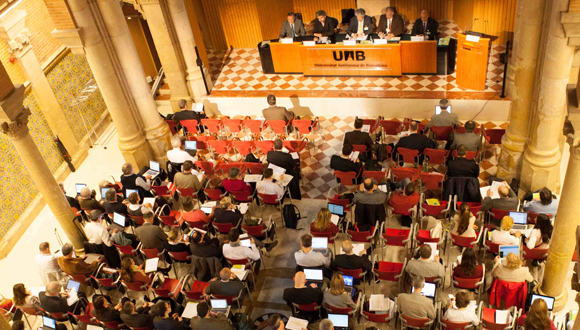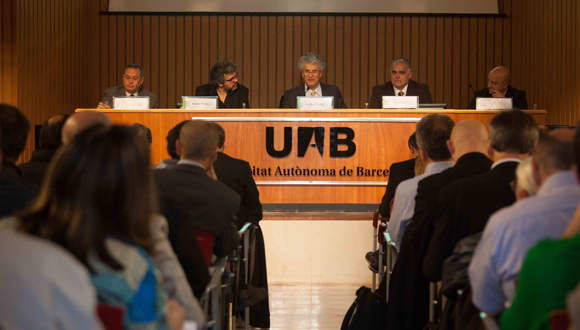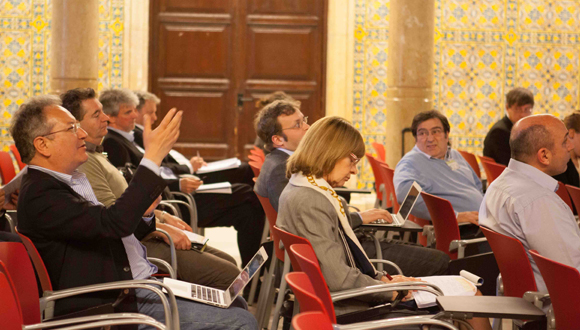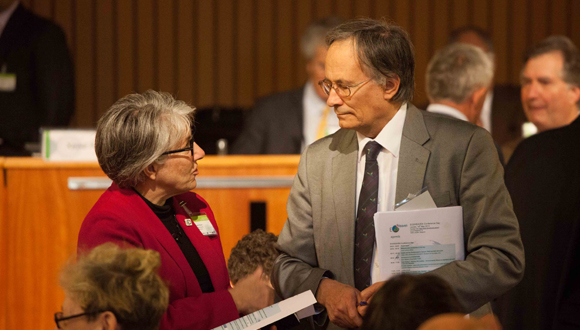nEWs
ENDS THE VII GEO EUROPEAN PROJECTS WORKSHOP ORGANIZED BY CREAF AND THE CE
Over 175 experts in Earth Observation from around the world met at the seventh workshop held on the 15th and 16th of April at the Casa de la Convalascència, one of the Universitat Autònoma de Barcelona facilities..
 Moment of the opening ceremony of GEPW7. Photo: Abel Pau.
Moment of the opening ceremony of GEPW7. Photo: Abel Pau.The city of Barcelona hosted the VII GEO European Projects Workshop organized by the European Commission and the Centre for Ecological Research and Forestry Applications (CREAF) on the 15th and 16th of April at the Universitat Autònoma de Barcelona facility called Casa de la Convalescència
The annual convention which had the slogan ‘GEOSS: An Earth Observatory for Europe's Citizens’ had the participation of more than 175 national and international Earth observation experts. Scientists shared experiences in projects that help to improve various aspects of the planet as well as the impact on society: environmental health, energy, weather, water management, climate, ecosystems, agriculture, biodiversity and prediction and reduction of consequences of natural disasters.
The event was inaugurated on April 15th by Andrea Tilche, Head of the Technology Environment of the European Commission; Jordi Mas, head of the Office of International Relations, University and Research of the Ministry of Economy and Knowledge of the Government of Catalonia; Fernando Belda, Director of Infrastructure and Production of the Spanish Meteorological Agency (AEMet); Xavier Pons, professor at the Universitat Autònoma de Barcelona; and Javier Retana, director of CREAF.
 Moment of the opening ceremony of GEPW7. Photo: Abel Pau.
Moment of the opening ceremony of GEPW7. Photo: Abel Pau.During the event, a large number of Earth observation projects financed by the 7th Framework Programme of the European Commission that supports research, education and innovation of excellence in Europe. Next to speak were the representatives of the administration, universities, research centers and Spanish private companies. The European Commission praised current initiatives and recognized the potential that this sector has in our country.
The European Commission contributes to the construction and improvement of the Global Earth Observation Systems of Systems (GEOSS) by funding research in Earth observation. Its aim is to achieve a cross border environmental geo-information exchange and at minimum cost. During the conference over 55 different initiatives were presented. Some examples are :
- The AGRICAB project, that aims to develop a framework to improve the ability of Earth observation to support the management of agriculture and forest management in Africa.
- The FUTUREVOLC project, which contributes to a long-term monitoring experiment in geologically active regions of Europe prone to natural disasters.
- The MEDINA project, that aims to improve the ability to implement policies and protocols designed to maintain or improve the quality of coastal ecosystems in North Africa
- The BalkanGEONet project, that mainly aims to identify and coordinate the activities of Earth observation in the Balkan region and pave the way for a future full inclusion of all Balkan countries in GEO.
- The GeoViQua project, project coordinated by CREAF, which is contributing by giving tools to visualize the quality indicators of the data.
 Discussion during GEPW7. Photo: Abel Pau.
Discussion during GEPW7. Photo: Abel Pau.The GEOSS also benefits from stable global networks such as from the biodiversity observation (GEOBON), from initiatives for monitoring and observing the oceans (Blue Planet Initiative), the geo-world agricultural monitoring (GEOGLAM), a global observation system for fluxes and deposition of Mercury (GMOS), a global observation network of forests (GFOI) and a system of observations and analysis of carbon (Carbon GEO).
All of them were represented at the conference. To be at the global forefront, the convention devoted a session to discuss new goals and objectives to be addressed during the 2015-2025 period. The second meeting of the Scientific and Technical Division of GEO-Spain also took place, where an action plan to further strengthen national research in this field was set.
 Feedback during GEPW7. Photo: Abel Pau.
Feedback during GEPW7. Photo: Abel Pau.During this meeting, the commitment of the European Commission to strengthen funding in the field of Earth observation became clear, in order to increase the knowledge of the world, all by encouraging the participation of companies and stimulating job creation within the new Horizon 2020 research program.
More information and speakers presentations at:
More information about GEO-Spain at:


